Unit 13 We're trying to save the earth-Section A Grammar Focus-4c课件(共45张PPT)人教新目标九年级英语
文档属性
| 名称 | Unit 13 We're trying to save the earth-Section A Grammar Focus-4c课件(共45张PPT)人教新目标九年级英语 | 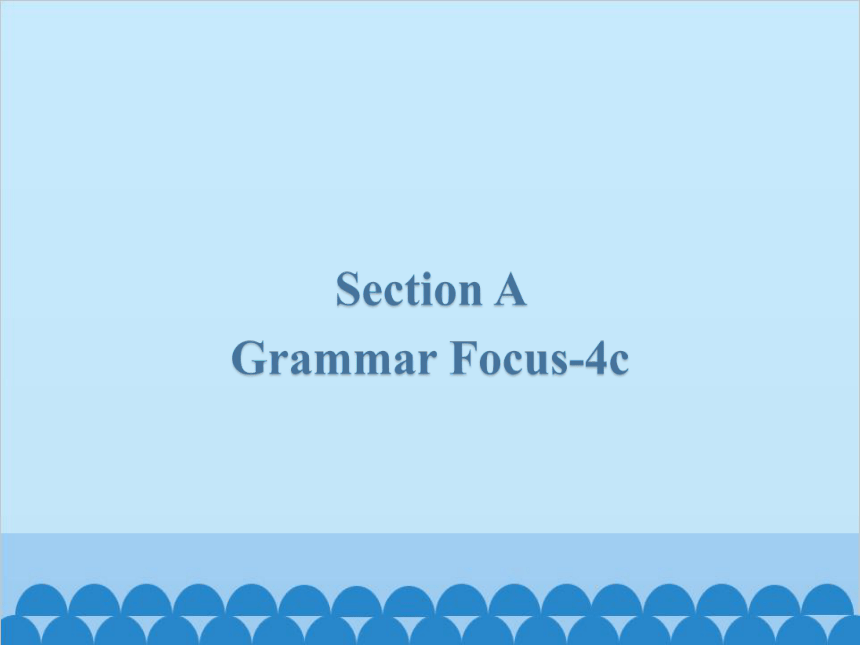 | |
| 格式 | pptx | ||
| 文件大小 | 1.0MB | ||
| 资源类型 | 教案 | ||
| 版本资源 | 人教新目标(Go for it)版 | ||
| 科目 | 英语 | ||
| 更新时间 | 2023-09-25 18:29:11 | ||
图片预览

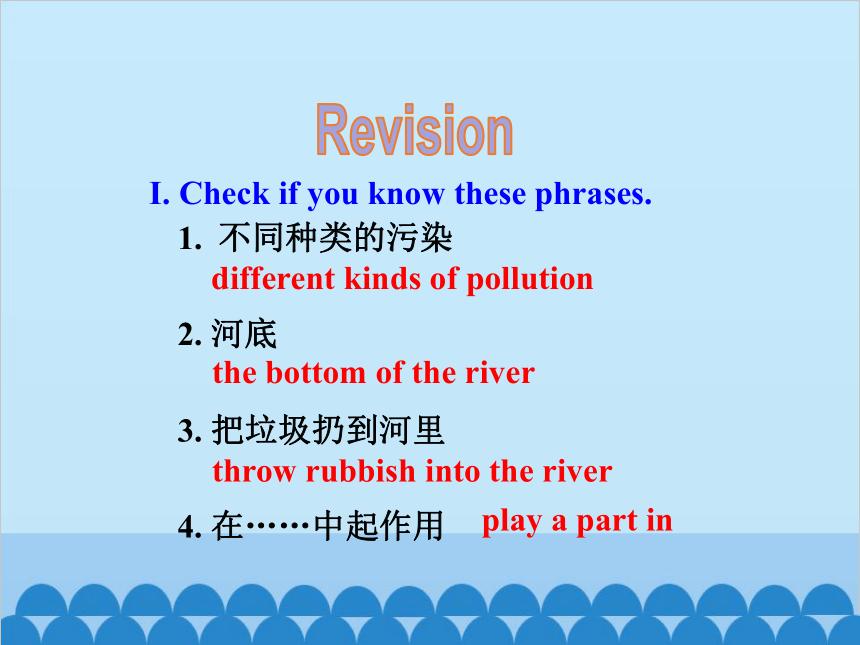
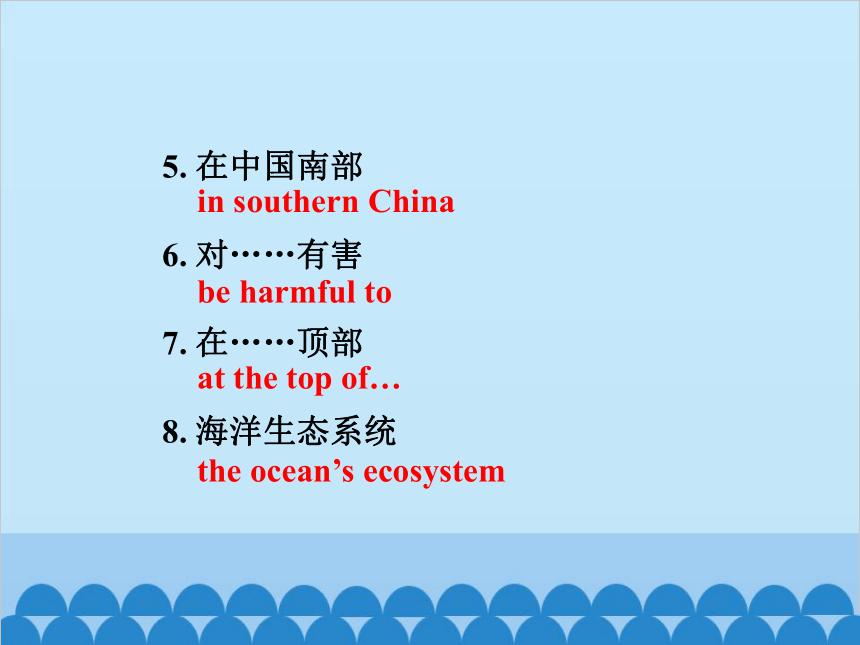
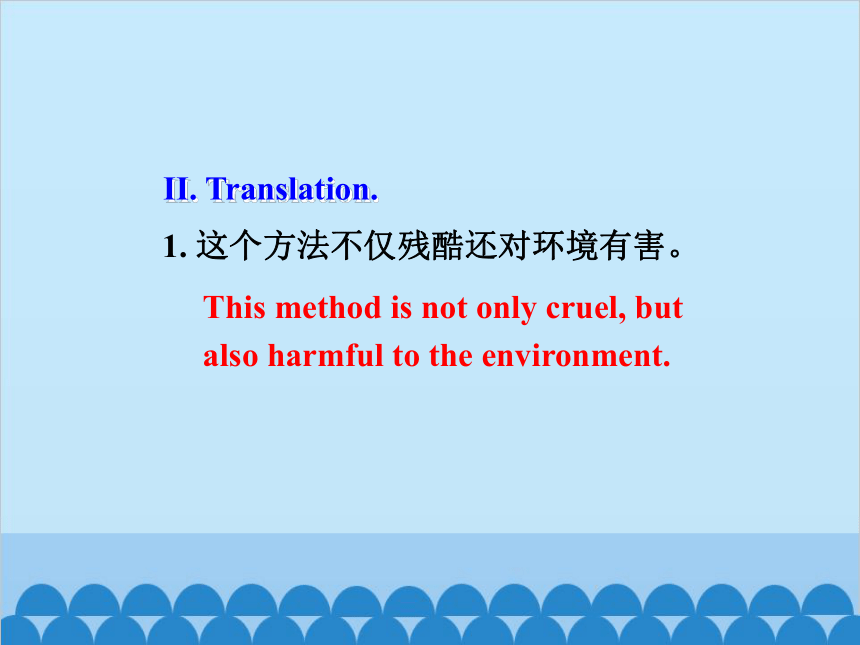
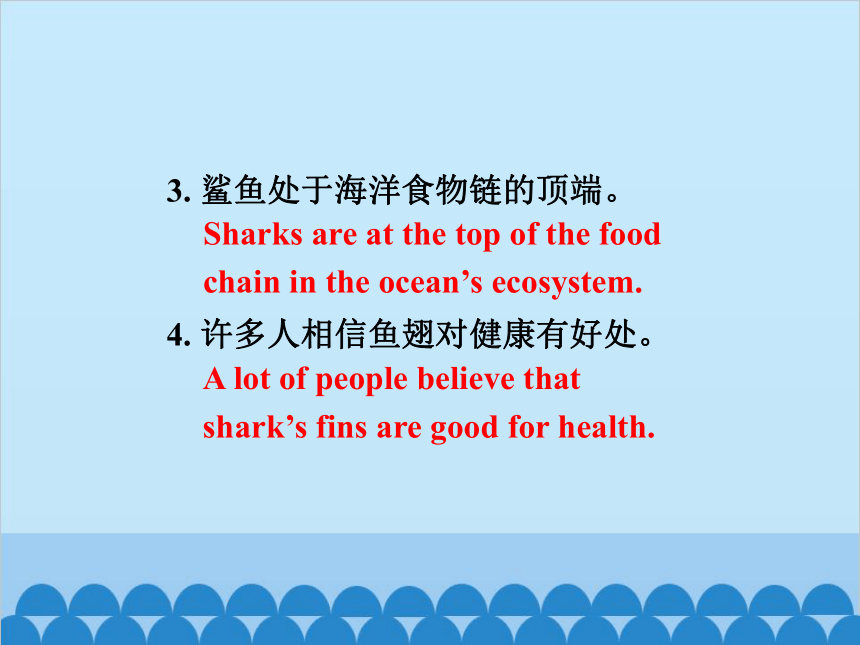
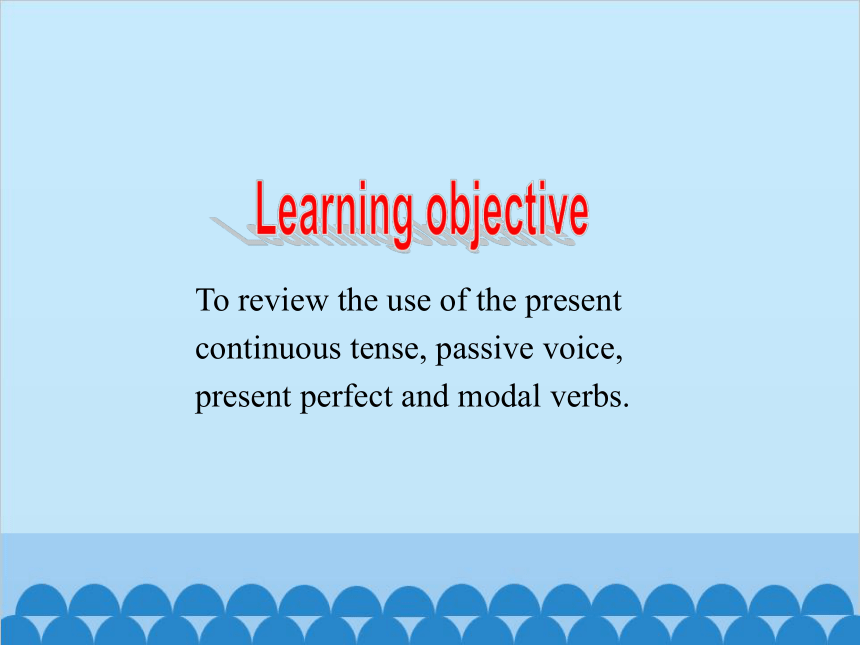
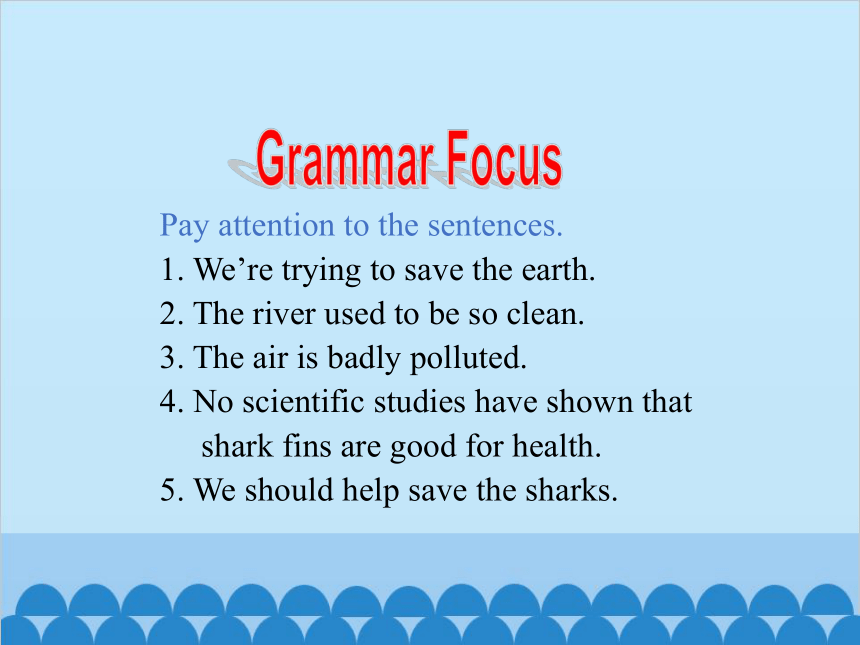
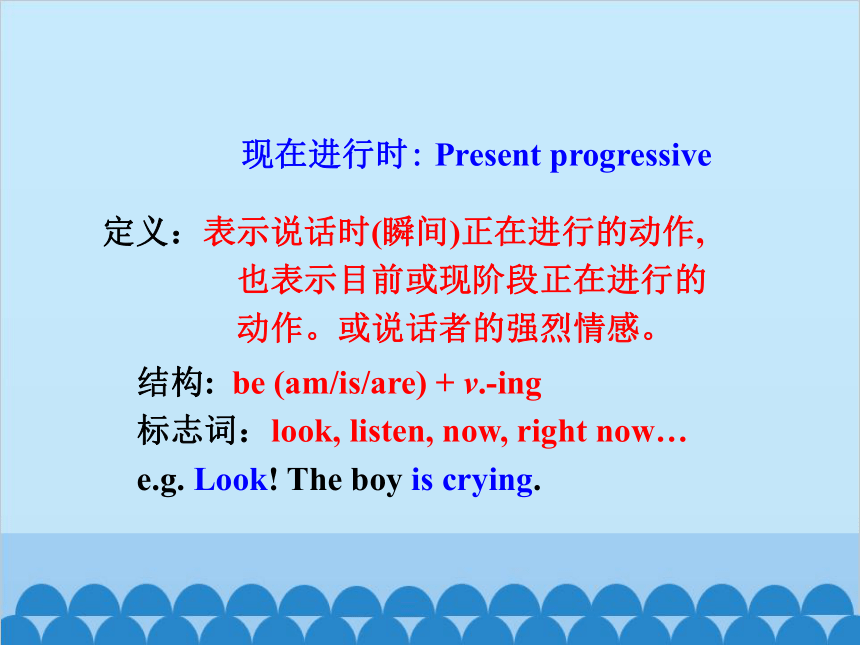
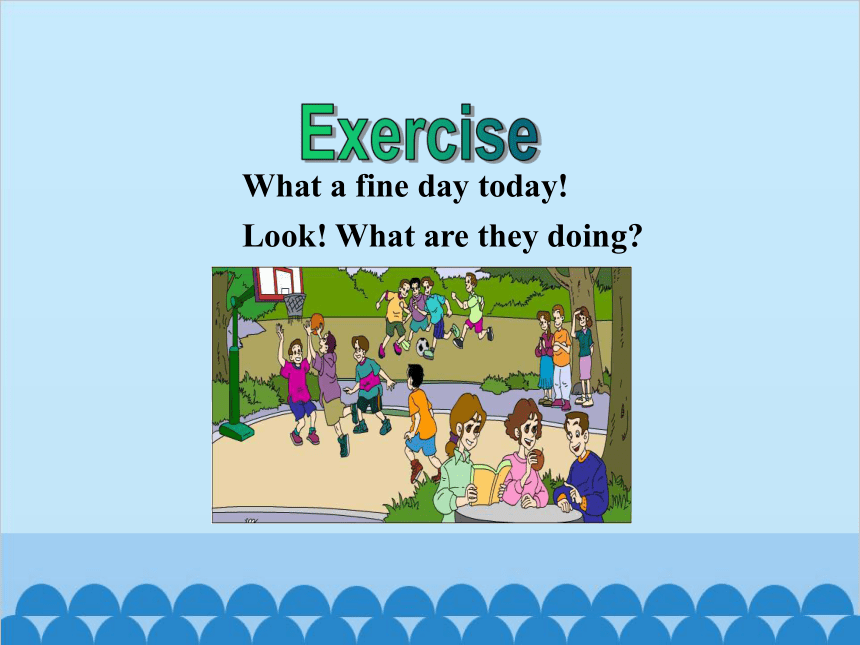
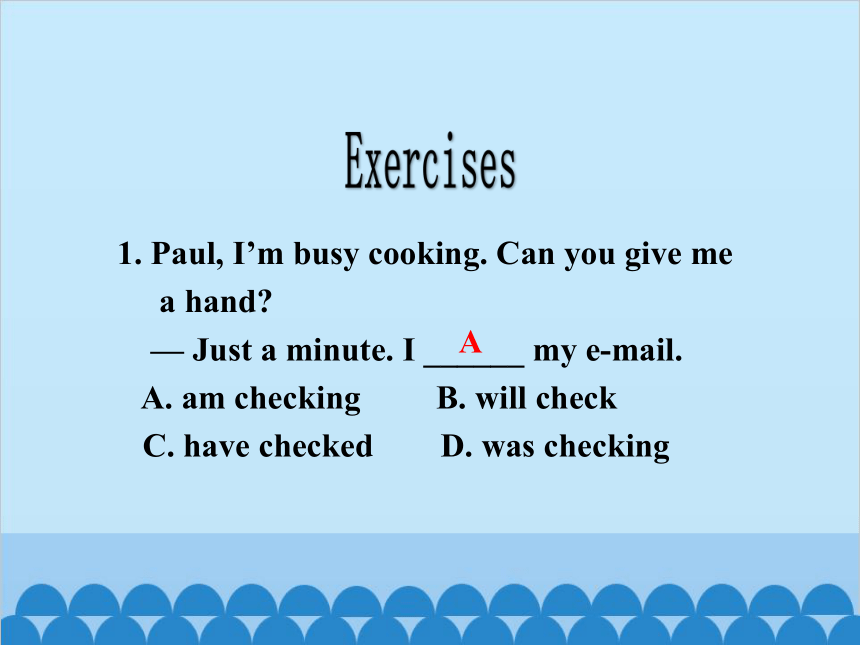

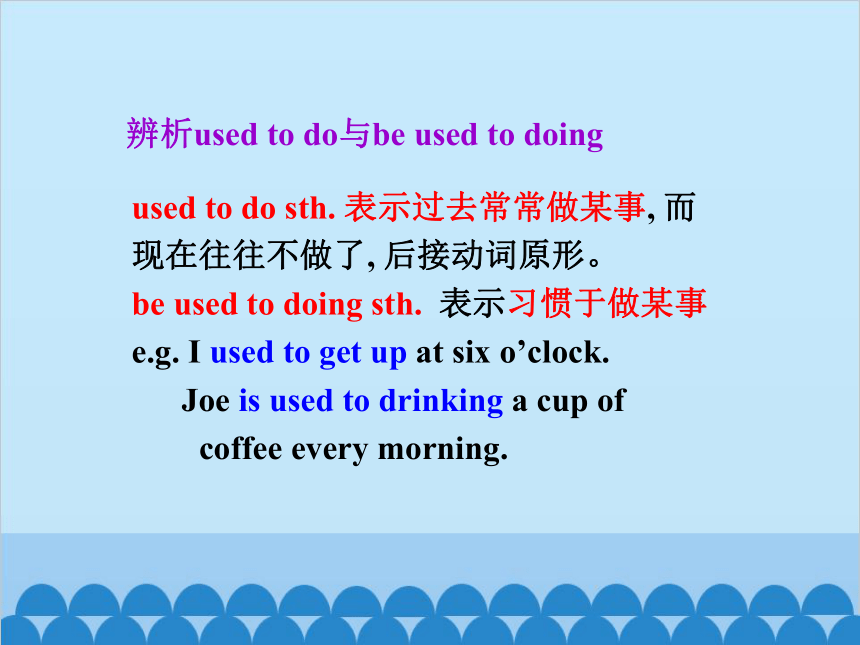
文档简介
(共45张PPT)
Section A
Grammar Focus-4c
Revision
不同种类的污染
2. 河底
3. 把垃圾扔到河里
4. 在……中起作用
different kinds of pollution
the bottom of the river
throw rubbish into the river
play a part in
I. Check if you know these phrases.
5. 在中国南部
6. 对……有害
7. 在……顶部
8. 海洋生态系统
in southern China
be harmful to
at the top of…
the ocean’s ecosystem
II. Translation.
1. 这个方法不仅残酷还对环境有害。
This method is not only cruel, but also harmful to the environment.
3. 鲨鱼处于海洋食物链的顶端。
4. 许多人相信鱼翅对健康有好处。
Sharks are at the top of the food chain in the ocean’s ecosystem.
A lot of people believe that shark’s fins are good for health.
Learning objective
To review the use of the present continuous tense, passive voice, present perfect and modal verbs.
Pay attention to the sentences.
1. We’re trying to save the earth.
2. The river used to be so clean.
3. The air is badly polluted.
4. No scientific studies have shown that shark fins are good for health.
5. We should help save the sharks.
Grammar Focus
现在进行时: Present progressive
结构: be (am/is/are) + v.-ing
标志词:look, listen, now, right now…
e.g. Look! The boy is crying.
定义:表示说话时(瞬间)正在进行的动作, 也表示目前或现阶段正在进行的动作。或说话者的强烈情感。
What a fine day today!
Look! What are they doing
Exercise
1. Paul, I’m busy cooking. Can you give me a hand
— Just a minute. I ______ my e-mail.
A. am checking B. will check
C. have checked D. was checking
Exercises
A
2. Don’t take the dictionary away, I _____ it.
A. use B. used
C. am using D. have used
C
used to do sth. 表示过去常常做某事, 而
现在往往不做了, 后接动词原形。
be used to doing sth. 表示习惯于做某事
e.g. I used to get up at six o’clock.
Joe is used to drinking a cup of coffee every morning.
辨析used to do与be used to doing
Translation.
1. 她过去常常周末和朋友闲逛。
She used to hang out with friends on weekends.
2. 他习惯晚睡。
He is used to staying up.
Exercises
被动语态:Passive voice
定义:表示主语是动作的承受者,即行
为动作的对象的一种语态。
结构:be + 过去分词
e.g. A new school was built last year.
Our classroom is cleaned every day.
③一般将来时的被动语态:will/shall+be+ v.-ed
②一般过去时的被动语态:was/were+ v.-ed
①一般现在时的被动语态:am/is/are + v.-ed
The first section of New College
English is designed for speaking practice
and is based on pictures and topics.
These computers were made in our own country last year.
Shall we be asked to attend the opening ceremony
1. 某些感官动词加形容词及少数其他的动词与一些副词连用表示被动意义。
smell, taste, prove, sell, etc.
(1) The dish tastes delicious.
(2) The theory proved right at last.
(3) The book is so interesting that it sells
well.
(4) The pen writes well.
不可以变成被动语态的情况
need做实意动词时,need + v.- ing
主动形式表示被动意义。
我的车需要修理。
My car needs repairing.
(=My car needs to be repaired).
战争爆发了。
The war broke out.
但不能说:The war was broken out.
3. 通常只有及物动词(词组)才有被动语态,不及物动词没有。
Translate the sentences by using passive voice.
1. 刚才一些老年人参观了博物馆。
2. 工人们使用不同种类的机器工作。
The museum was visited by some old people just now.
Different kinds of machines are used to work by the workers.
Exercises
The mobile phone ______ in 1973.
A. invents B. is invented
C. invented D. was invented
D
2. Let’s wait and see whether books _____ by the Internet in the future.
A. replace B. replaced
C. will be replaced D. were replaced
C
3. —Why are you leaving your job
—I can’t stand it any longer. I _____ always _____ to work overtime.
A. am; asking B. am; asked
C. was; asking D. was; asked
B
结构: has/have + 过去分词
标志词:already, yet, ever, never, since, for…
e.g. I haven’t finished my homework yet.
定义:表示动作已经完成, 但对现在造成了影响; 或者表示从过去某一时间开始一直延续到现在并还可能持续下去的动作。
现在完成时: Present perfect
Complete the following sentences.
I _________ (be) in Beijing for two years.
2. I _____ never _____ (hear) of that man before.
3. Tom __________ (work) there since
two years ago.
have been
have
heard
has worked
4. The twins ___________ (wash) the clothes for an hour.
5. He _________ (play) basketball since three years ago.
6. How long ____ Sally _____ (sing) yet
have washed
has played
has
sung
1. Lily is my classmate. We ______ each other since she came to our school.
A. know B. knew
C. have known D. will know
C
2. I _____ in the city since I left school.
A. live B. will live
C. was living D. have lived
D
3. In the past few years, many schools ______ the ways of doing morning exercises.
A. change B. changes
C. will change D. have changed
D
1. 情态动词本身有一定的词义, 表示说话人的情绪、态度或语气, 但不能单独作谓语, 只能与其他动词构成谓语。
常见的有: can, could, may, might, must, need, shall, should, will, would等。
情态动词
2. 情态动词无人称和数的变化, 后接动词原形。否定式是在情态动词后面加not。个别情态动词有过去式形式, 可用来表达更加客气、委婉的语气。
e.g. Ken can climb up the trees like a
koala.
Tracy could ride a bicycle when
she was five years old.
You mustn’t play with fire. It is
dangerous.
Translation.
1. 我们不能在教室里吃东西。
2. 首先你必须完成作业。
3. 他现在不可能在家。
4. 她一定知道这个问题的答案。
Exercises
We can’t eat in the classroom.
You must finish your homework first.
He can’t be at home now.
She must know the answer to this question.
1. —_____ I park my car here for a while
— No, you mustn’t. Do you see the sign “NO PARKING”
A. Would B. May
C. Must D. Should
B
2. — May I take the dog with me, sir
— ______. Pets are not allowed to enter the hall.
A. Yes, you may B. No, you mustn’t
C. Yes, you can D. No, you needn’t
B
3. — I don’t care what people think.
— Well, you _____. You’re not alone in this world.
A. can B. may
C. should D. will
C
4. I have traveled a lot. I _____ speak four languages.
A. can B. may
C. must D. need
A
4a
Fill in the blanks with the correct forms of the verbs in brackets.
Joe: _____ you ever ______ (take) part in
an environmental project
Eric: Yes, I have. I ______ (help) with a
Clean-Up Day last year. It was
__________ (consider) the biggest
clean-up project this city ____ ever
____ (have).
Have
taken
helped
considered
had
had
Joe: How many people ____ (take) part
Eric: I _____ (think) more than 1,000
people ______ (come) to help out.
Joe: That’s fantastic! I guess everyone in
this city is ______ (try) to improve
the environment.
Eric: Yes, we can’t afford to ____ (wait)
any longer to take action!
took
think
came
trying
wait
4b
Fill in the blanks with the appropriate
modal verbs from the box.
People __________ think that big things
_____________ be done to save the earth. Many forget that saving the earth begins with small things.
may/might
must/have to
can would could have to should must may/ might
For example, you ____________________
save electricity by turning off the lights when you leave a room. You ________________ also use reusable bags instead of plastic bags.
can/could
could/can
can would could have to should must may/ might
I think it’s a great idea that you now ______ pay for plastic bags in some stores. And instead of driving to school or work, you ________________ ride your bike or walk. If it’s far, you _________ take the bus.
have to
can/should/could
can/could
can would could have to should must may/ might
All these small things __________ add up and become big things that _______________ improve the environment. Let’s take action now!
can/could
would/can/could
can would could have to should must may/ might
4c
Make a list of things that people can do to help the environment and discuss your list with your partner.
use public transportation
turn off the lights when you leave a room; use reusable bags instead of plastic bags; ride your bike or walk to school or work;recycle books and paper…
Discussion
I think that everyone should use public transportation.
I disagree. It’s difficult for parents with young children to use public transportation…
1. We can’t afford to wait any longer to take action!
afford v. 承担得起(后果);买得起
常与can, be able to连用
afford sth. 买得起/承受得起某物
afford to do sth. 有能力做某事/负担得起做某事
e.g. Can you afford the mobile phone
We can’t afford to pay such a price.
afford & buy
afford侧重“有经济能力买”,而buy则侧重“购买(这一行为)”。
表示“我买不起……”可以说I can’t afford ...,但不能说I can’t buy ...。
用afford或buy的适当形式填空。
1) They can’t _______ to send their children to college.
2) Can you _______ a new car
3) Helen _______ some fruit on her way home yesterday.
afford
afford
bought
2. …save electricity by turning off the lights when you leave a room.
turn off 关掉
e.g. 睡觉前请关掉电视。
Please turn the television off
before you go to bed.
turn on 打开; 发动
turn around 转身
turn up 调高(音量)
turn down 调低; 拒绝
turn into 变成; 进入
turn over 移交
拓展: turn相关短语
Finish the exercises in the workbook.
Preview the new words and expressions.
Section A
Grammar Focus-4c
Revision
不同种类的污染
2. 河底
3. 把垃圾扔到河里
4. 在……中起作用
different kinds of pollution
the bottom of the river
throw rubbish into the river
play a part in
I. Check if you know these phrases.
5. 在中国南部
6. 对……有害
7. 在……顶部
8. 海洋生态系统
in southern China
be harmful to
at the top of…
the ocean’s ecosystem
II. Translation.
1. 这个方法不仅残酷还对环境有害。
This method is not only cruel, but also harmful to the environment.
3. 鲨鱼处于海洋食物链的顶端。
4. 许多人相信鱼翅对健康有好处。
Sharks are at the top of the food chain in the ocean’s ecosystem.
A lot of people believe that shark’s fins are good for health.
Learning objective
To review the use of the present continuous tense, passive voice, present perfect and modal verbs.
Pay attention to the sentences.
1. We’re trying to save the earth.
2. The river used to be so clean.
3. The air is badly polluted.
4. No scientific studies have shown that shark fins are good for health.
5. We should help save the sharks.
Grammar Focus
现在进行时: Present progressive
结构: be (am/is/are) + v.-ing
标志词:look, listen, now, right now…
e.g. Look! The boy is crying.
定义:表示说话时(瞬间)正在进行的动作, 也表示目前或现阶段正在进行的动作。或说话者的强烈情感。
What a fine day today!
Look! What are they doing
Exercise
1. Paul, I’m busy cooking. Can you give me a hand
— Just a minute. I ______ my e-mail.
A. am checking B. will check
C. have checked D. was checking
Exercises
A
2. Don’t take the dictionary away, I _____ it.
A. use B. used
C. am using D. have used
C
used to do sth. 表示过去常常做某事, 而
现在往往不做了, 后接动词原形。
be used to doing sth. 表示习惯于做某事
e.g. I used to get up at six o’clock.
Joe is used to drinking a cup of coffee every morning.
辨析used to do与be used to doing
Translation.
1. 她过去常常周末和朋友闲逛。
She used to hang out with friends on weekends.
2. 他习惯晚睡。
He is used to staying up.
Exercises
被动语态:Passive voice
定义:表示主语是动作的承受者,即行
为动作的对象的一种语态。
结构:be + 过去分词
e.g. A new school was built last year.
Our classroom is cleaned every day.
③一般将来时的被动语态:will/shall+be+ v.-ed
②一般过去时的被动语态:was/were+ v.-ed
①一般现在时的被动语态:am/is/are + v.-ed
The first section of New College
English is designed for speaking practice
and is based on pictures and topics.
These computers were made in our own country last year.
Shall we be asked to attend the opening ceremony
1. 某些感官动词加形容词及少数其他的动词与一些副词连用表示被动意义。
smell, taste, prove, sell, etc.
(1) The dish tastes delicious.
(2) The theory proved right at last.
(3) The book is so interesting that it sells
well.
(4) The pen writes well.
不可以变成被动语态的情况
need做实意动词时,need + v.- ing
主动形式表示被动意义。
我的车需要修理。
My car needs repairing.
(=My car needs to be repaired).
战争爆发了。
The war broke out.
但不能说:The war was broken out.
3. 通常只有及物动词(词组)才有被动语态,不及物动词没有。
Translate the sentences by using passive voice.
1. 刚才一些老年人参观了博物馆。
2. 工人们使用不同种类的机器工作。
The museum was visited by some old people just now.
Different kinds of machines are used to work by the workers.
Exercises
The mobile phone ______ in 1973.
A. invents B. is invented
C. invented D. was invented
D
2. Let’s wait and see whether books _____ by the Internet in the future.
A. replace B. replaced
C. will be replaced D. were replaced
C
3. —Why are you leaving your job
—I can’t stand it any longer. I _____ always _____ to work overtime.
A. am; asking B. am; asked
C. was; asking D. was; asked
B
结构: has/have + 过去分词
标志词:already, yet, ever, never, since, for…
e.g. I haven’t finished my homework yet.
定义:表示动作已经完成, 但对现在造成了影响; 或者表示从过去某一时间开始一直延续到现在并还可能持续下去的动作。
现在完成时: Present perfect
Complete the following sentences.
I _________ (be) in Beijing for two years.
2. I _____ never _____ (hear) of that man before.
3. Tom __________ (work) there since
two years ago.
have been
have
heard
has worked
4. The twins ___________ (wash) the clothes for an hour.
5. He _________ (play) basketball since three years ago.
6. How long ____ Sally _____ (sing) yet
have washed
has played
has
sung
1. Lily is my classmate. We ______ each other since she came to our school.
A. know B. knew
C. have known D. will know
C
2. I _____ in the city since I left school.
A. live B. will live
C. was living D. have lived
D
3. In the past few years, many schools ______ the ways of doing morning exercises.
A. change B. changes
C. will change D. have changed
D
1. 情态动词本身有一定的词义, 表示说话人的情绪、态度或语气, 但不能单独作谓语, 只能与其他动词构成谓语。
常见的有: can, could, may, might, must, need, shall, should, will, would等。
情态动词
2. 情态动词无人称和数的变化, 后接动词原形。否定式是在情态动词后面加not。个别情态动词有过去式形式, 可用来表达更加客气、委婉的语气。
e.g. Ken can climb up the trees like a
koala.
Tracy could ride a bicycle when
she was five years old.
You mustn’t play with fire. It is
dangerous.
Translation.
1. 我们不能在教室里吃东西。
2. 首先你必须完成作业。
3. 他现在不可能在家。
4. 她一定知道这个问题的答案。
Exercises
We can’t eat in the classroom.
You must finish your homework first.
He can’t be at home now.
She must know the answer to this question.
1. —_____ I park my car here for a while
— No, you mustn’t. Do you see the sign “NO PARKING”
A. Would B. May
C. Must D. Should
B
2. — May I take the dog with me, sir
— ______. Pets are not allowed to enter the hall.
A. Yes, you may B. No, you mustn’t
C. Yes, you can D. No, you needn’t
B
3. — I don’t care what people think.
— Well, you _____. You’re not alone in this world.
A. can B. may
C. should D. will
C
4. I have traveled a lot. I _____ speak four languages.
A. can B. may
C. must D. need
A
4a
Fill in the blanks with the correct forms of the verbs in brackets.
Joe: _____ you ever ______ (take) part in
an environmental project
Eric: Yes, I have. I ______ (help) with a
Clean-Up Day last year. It was
__________ (consider) the biggest
clean-up project this city ____ ever
____ (have).
Have
taken
helped
considered
had
had
Joe: How many people ____ (take) part
Eric: I _____ (think) more than 1,000
people ______ (come) to help out.
Joe: That’s fantastic! I guess everyone in
this city is ______ (try) to improve
the environment.
Eric: Yes, we can’t afford to ____ (wait)
any longer to take action!
took
think
came
trying
wait
4b
Fill in the blanks with the appropriate
modal verbs from the box.
People __________ think that big things
_____________ be done to save the earth. Many forget that saving the earth begins with small things.
may/might
must/have to
can would could have to should must may/ might
For example, you ____________________
save electricity by turning off the lights when you leave a room. You ________________ also use reusable bags instead of plastic bags.
can/could
could/can
can would could have to should must may/ might
I think it’s a great idea that you now ______ pay for plastic bags in some stores. And instead of driving to school or work, you ________________ ride your bike or walk. If it’s far, you _________ take the bus.
have to
can/should/could
can/could
can would could have to should must may/ might
All these small things __________ add up and become big things that _______________ improve the environment. Let’s take action now!
can/could
would/can/could
can would could have to should must may/ might
4c
Make a list of things that people can do to help the environment and discuss your list with your partner.
use public transportation
turn off the lights when you leave a room; use reusable bags instead of plastic bags; ride your bike or walk to school or work;recycle books and paper…
Discussion
I think that everyone should use public transportation.
I disagree. It’s difficult for parents with young children to use public transportation…
1. We can’t afford to wait any longer to take action!
afford v. 承担得起(后果);买得起
常与can, be able to连用
afford sth. 买得起/承受得起某物
afford to do sth. 有能力做某事/负担得起做某事
e.g. Can you afford the mobile phone
We can’t afford to pay such a price.
afford & buy
afford侧重“有经济能力买”,而buy则侧重“购买(这一行为)”。
表示“我买不起……”可以说I can’t afford ...,但不能说I can’t buy ...。
用afford或buy的适当形式填空。
1) They can’t _______ to send their children to college.
2) Can you _______ a new car
3) Helen _______ some fruit on her way home yesterday.
afford
afford
bought
2. …save electricity by turning off the lights when you leave a room.
turn off 关掉
e.g. 睡觉前请关掉电视。
Please turn the television off
before you go to bed.
turn on 打开; 发动
turn around 转身
turn up 调高(音量)
turn down 调低; 拒绝
turn into 变成; 进入
turn over 移交
拓展: turn相关短语
Finish the exercises in the workbook.
Preview the new words and expressions.
同课章节目录
- Unit 1 How can we become good learners.
- Section A
- Section B
- Unit 2 I think that mooncakes are delicious!
- Section A
- Section B
- Unit 3 Could you please tell me where the restroom
- Section A
- Section B
- Unit 4 I used to be afraid of the dark.
- Section A
- Section B
- Unit 5 What are the shirts made of?
- Section A
- Section B
- Review of Units 1-5
- Unit 6 When was it invented?
- Section A
- Section B
- Unit 7 Teenagers should be allowed to choose their
- Section A
- Section B
- Unit 8 It must belong to Carla.
- Section A
- Section B
- Unit 9 I like music that I can dance to.
- Section A
- Section B
- Unit 10 You're supposed to shake hands.
- Section A
- Section B
- Review of Units 6-10
- Unit 11 Sad movies make me cry.
- Section A
- Section B
- Unit 12 Life is full of the unexpected
- Section A
- Section B
- Unit 13 We're trying to save the earth!
- Section A
- Section B
- Unit 14 I remember meeting all of you in Grade 7.
- Section A
- Section B
- Review of Units 11-14
